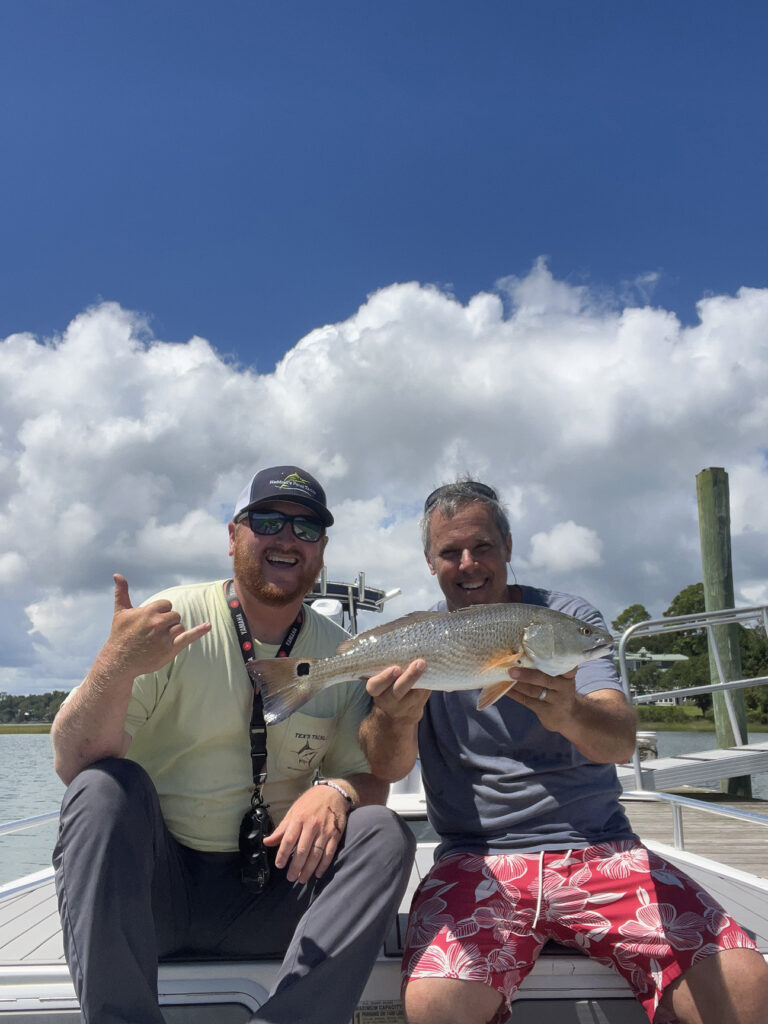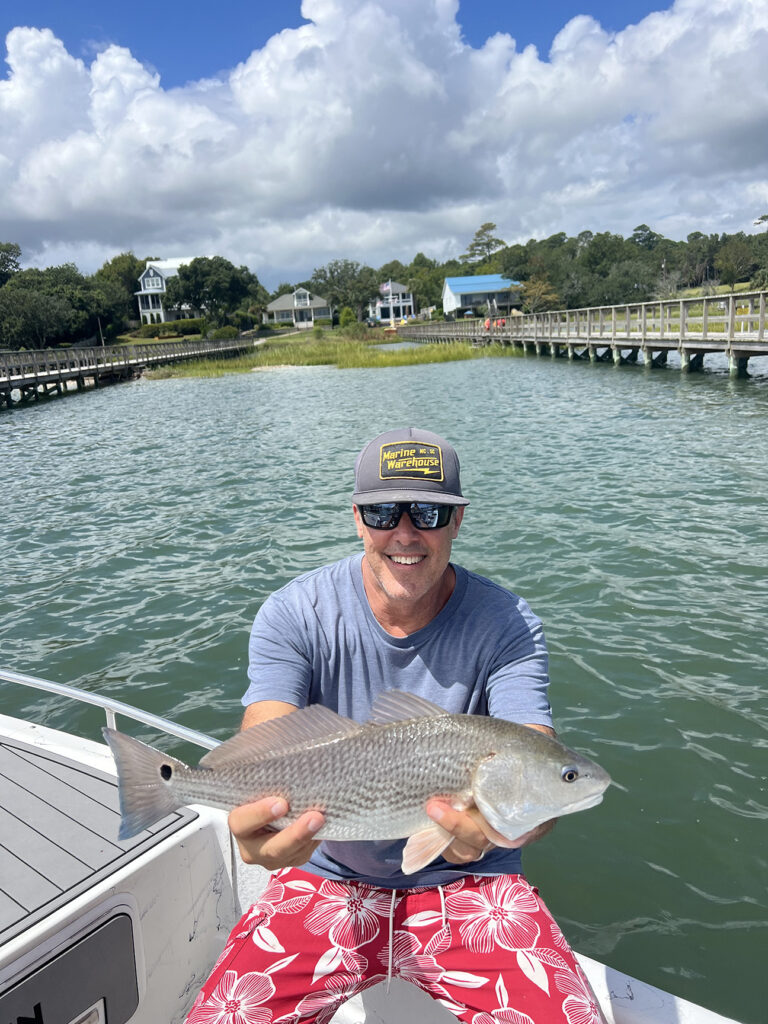Tidelines – September 2024
In most of August, talking about inshore fishing meant talking about Debby. Whether you referred to it as a tropical storm, a depression, or just a weather event didn’t really matter, but everyone agreed that its negative effects on water conditions lasted not days but weeks.
Thank goodness for red drum, one of the hardiest of the inshore species, or at least one of the summer inshore species least affected by rainwater and rainwater runoff. And thank goodness for Capt. Pierre Agena, of Rising Sun Fishing Charters out of the Wrightsville Beach area, who was able to fit me in for a quick trip right before the “Tidelines” print deadline.
Wrightsville Beach, like the entire NC coast, had a huge influx of freshwater and runoff following Debby that dirtied the water, threw off the salinity, and made it difficult to present a bait to a fish. On my lunchtime trip with Pierre, the water was getting cleaner, especially on the incoming tide, but conditions were still far from normal.
“I’ve been switching over more to something with a little smell to it,” Pierre explained as he readied his 8’ cast net while using the trolling motor to move around a small marina looking for surface activity. “I’ve been using more cut bait than live bait lately, and I’ve also been using louder topwaters in the morning.”
When Pierre picked me up, his livewell was full with live mullet, but a cut pogie will put out more smell than a live mullet, so we were in the marina looking for flips. Menhaden, though, had been one of the consequences of Debby, as the area was flush with them prior to the rains, but then they were almost nonexistent following the rains. Some believed they had been pushed out, an others figured they had been pushed deep.

Capt. Pierre Agena (left), of Rising Sun Fishing Charters, and Gary Hurley, of Fisherman’s Post, with one of the mid-slot red drum they pulled off an ICW dock in the Wrightsville Beach area. The drum hit a live mullet on a knocker rig.
“The water conditions also have me doing a lot of dock and ICW red drum fishing, and less creek fishing,” he continued. We finally saw some consistent flip activity out in the middle, and two throws later, we added over a dozen fresh baits to the livewell. His hope was to find flips between docks in the marina, letting his cast net to get to the bottom more quickly in the shallower water to have a greater chance of success, but the post-Debby pogies thought differently.
While red drum are resilient, cleaner water is preferred, and that cleaner water was easier to find starting with the mid-incoming tide. In addition, these are the dog days of summer, and the incoming tide brings the cooler water in, too.
Our time together was going to be dock fishing, and when asked about selecting docks, Pierre replied, “You want an older dock, even a decrepit looking dock, and I like grass lines behind a dock, more than a bulkhead. I think that grass holds a lot more bait.”
We came in quietly under trolling motor between two docks, and then Pierre dropped down his two Power Poles to hold us perfectly in place so that we could cast from the bow of the boat with the bow pointed directly at the shoreline.
“I try to be as stealthy as possible,” he instructed while using the bait net to pull out a pogie. “If you don’t have a trolling motor and Power Poles, come in very quietly, try to cut the motor off early, and softly slide your anchor into the water. All these details make a difference when you’re dock fishing.”
I was told to cast my cut pogie in the “corner pocket,” the place right where the grass line met the dock. Pierre cast a live mullet along the grassline, too, but out in the middle between the two docks. He put that rod in the rod holder, and then he cast another piece of cut pogie a little further up the dock in deeper water, keeping the second rod in hand.
His standard summertime red drum rig is a knocker rig: a 3/0 circle hook connected to the braid with a 3-4’ fluoro leader, and he adds a bobber stopper to the fluoro right before the uni to uni knot. This helps keep the 1/2 oz. egg weight from sliding over the knot. For the pogies, he cuts the heads and tails off, and then hooks the bait chunk through the top half in the meatiest section.

Gary Hurley with a red drum that hit a piece of cut pogie soaking where a grass line meets an ICW dock. He was fishing the high tide with Capt. Pierre Agena of Rising Sun Fishing Charters.
The rod in my hand was medium-heavy with the drag locked down pretty tight. He’d been landing upper-slot and over-slot fish recently, and he told me he didn’t want a heartbreak fish, especially when we were fishing under the pressure of my writing deadline.
“Don’t worry about the pinfish,” he advised, watching me watch my rod tip jump around. “Let that pinfish work on it. The pinfish are creating chum in the water, and that redfish will hopefully key in on other fish feeding and then come in and grab it.”
The pecks continued, and then the pecks stopped. With no more pecks, it was time to check my bait. An empty circle hook came back, so Pierre put a fresh chunk on and instructed me to send it back to the exact same spot.
The cut pogie landed once again close to one of the dock pilings right at the grass line, and this time the pecks were followed by a big bend in the rod and a fish pulling hard to get under the dock.
Tight drag and a strong rod worked, and soon the fish was out in the open water between the two docks and headed for the boat. And while releasing the mid-slot fish after a photo, Pierre’s grass line bait, the one in the rod holder, also doubled over. Rod holders don’t work well when your bait is close or under the dock, but they work great when you’re letting a bait sit along a grass line and comfortably spaced between two docks.
I had requested of Pierre, only the day before, two red drum for the purposes of an article, and despite the challenges of Debby (and the deadline), he had delivered.
Capt. Pierre Agena, of Rising Sun Fishing Charters out of the Wrightsville Beach area, will be targeting red drum in along the ICW, on docs, and in creeks all of September. Towards the end of the month, he will also spend time on the jetties and other nearshore locations.
You can get a better idea of the trips Pierre offers by visiting www.rising-sun-fishing.com, or call him directly at (704) 706-4827.
Pierre, like a red drum, is resilient. He’s a guide that finds a way to produce no matter the challenges, so if you’re telling him a story and don’t notice that a fish has picked up your bait on one dock and traveled with it all the way to the next dock and wrapped a piling (hypothetically, of course), then he’ll help get the fish unwrapped or find you another.
And if you hook a fish and get it all the way to the boat before letting it pop off right before the net (again, playing make-believe here), he’ll quickly cut up another pogie.
With that level of patience and grace under pressure, Pierre should think about also being a high school teacher.
